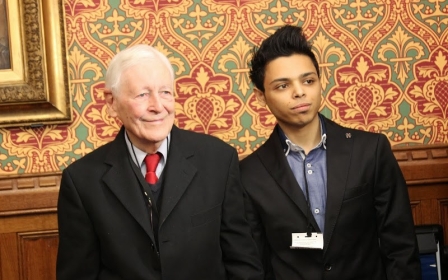UK suspends deportation of seriously ill Bahraini activist
British authorities on Monday stopped the deportation of a seriously ill Bahraini activist, who claims to be at risk of being killed by authorities in the Gulf state.
Ali Isa Hasan, 26, has been held at Tinsley House immigration removal centre near Gatwick Airport since September, when the High Court in London threw out an appeal challenging the Home Office’s decision to turn down his asylum application.
Hasan was due to be removed from the UK to Bahrain on Tuesday but the Home Office agreed to stop the deportation in order to consider new evidence in support of his case.
The new evidence includes a psychological assessment of Hasan, seen by Middle East Eye, which says the Bahraini is suicidal and suffering from severe depression caused by his proposed deportation.
Hasan told Middle East Eye on Monday that he would have killed himself if the UK had gone through with the deportation.
“I was counting the minutes [until the deportation] but now I have hope again,” he said.
Arden Solicitors, who represent Hasan, said that media coverage of his case – by Middle East Eye and the Independent – meant that if he were deported to Bahrain now “he would be at even greater risk of persecution”.
Hasan fled to the UK in November 2011 out of fear he was going to be imprisoned and tortured in Bahrain for taking part in pro-democracy protests against the ruling al-Khalifa royal family.
He had hoped to join his family in London who were granted asylum by the Home Office, which accepted that his father Mohammed would be at risk of persecution if he was deported to Bahrain, where he had lost his job for taking part in pro-democracy protests.
The Home Office originally rejected Hasan’s asylum claim on the grounds he had given inconsistent testimony about his activism in Bahrain, an allegation his lawyers accept but say was caused in part by a serious medical condition he is suffering from.
Hasan has sickle cell anaemia, which means he has a reduced life expectancy and is regularly hospitalised, all of which doctors said could have impacted his ability to answer questions coherently.
A medical report seen by Middle East Eye said that Hasan’s condition is serious enough that one blow to his abdomen could rupture his spleen, which is swollen because of his anaemia, and kill him.
This led Dr Tamara Joffe of the Kilburn Park Medical Centre to say she was “extremely worried to hear that Ali may be deported to Bahrain where he risks incarceration and torture”.
Bahraini authorities are regularly accused of detaining and torturing activists and protesters calling for democratic reforms on the Khalifa-ruled island.
The Home Office will now consider the psychological assessment and decide whether to uphold their decision to reject asylum or grant Hasan leave to remain in the UK.
His lawyer said the decision to cancel Tuesday’s planned deportation was a positive sign for Hasan’s hopes of avoiding deportation.
“If the Home Office felt these new documents would not add anything new they would have continued with the deportation,” said Leqa al-Habib. “The fact that they have said they need to reconsider these documents thoroughly – it’s a very good sign.”
While it is not known when the Home Office will issue a new ruling on Hasan’s case, Habib said due to him being held at a removal centre it is likely authorities will decide “in the next week or two”.
Hasan’s father Mohamed said he was overjoyed the Home Office had cancelled the deportation, adding that he hoped the new decision will prove favourable for his son.
“We came to the UK because we thought our human rights would be protected,” he said. “We hope the Home Office will do this now and allow Ali to stay and give him the chance to live a life free from the fear of torture.”
Home Office statistics show that it is extremely rare for a Bahraini to be forcibly removed from the UK. Figures published in June this year show that since 2011, 121 Bahrainis have applied for asylum in the UK, with the majority of applicants being accepted.
Only one Bahraini in the past three years - and seven in total since 2011 - have been forcibly removed from the UK.
The Home Office did not respond to calls for comment on Tuesday but previously told Middle East Eye that “the UK has a proud history of granting asylum to those who genuinely need it and every case is carefully considered on its individual merits".
New MEE newsletter: Jerusalem Dispatch
Sign up to get the latest insights and analysis on Israel-Palestine, alongside Turkey Unpacked and other MEE newsletters
Middle East Eye delivers independent and unrivalled coverage and analysis of the Middle East, North Africa and beyond. To learn more about republishing this content and the associated fees, please fill out this form. More about MEE can be found here.




